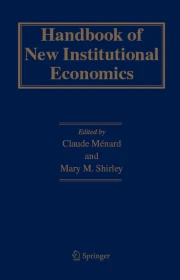
This is a preview of subscription content, log in via an institution to check access.
Softcover Book EUR 126.59
Price includes VAT (France)Tax calculation will be finalised at checkout
New Institutional Economics (NIE) has skyrocketed in scope and influence over the last three decades. This first Handbook of NIE provides a unique and timely overview of recent developments and broad orientations. Contributions analyse the domain and perspectives of NIE; sections on legal institutions, political institutions, transaction cost economics, governance, contracting, institutional change, and more capture NIE's interdisciplinary nature. This Handbook will be of interest to economists, political scientists, legal scholars, management specialists, sociologists, and others wishing to learn more about this important subject and gain insight into progress made by institutionalists from other disciplines. This compendium of analyses by some of the foremost NIE specialists, including Ronald Coase, Douglass North, Elinor Ostrom, and Oliver Williamson, gives students and new researchers an introduction to the topic and offers established scholars a reference book for their research.
From the reviews:
The Handbook of New Institutional Economics edited by Claude Menard and Mary Shirley gives an excellent picture of this emerging field. It also addresses the most interesting questions now at the forefront of economic research. - George Akerlof, University of California at Berkeley; Nobel Laureate
Over the last thirty years, a very important influence on the development of economic analysis has been the emphasis on rights to property, their transferability and their implications for economic behavior, especially in relation to the law. It is very valuable to have the material of the "new institutional economics" brought together in a handbook, and especially so when the authors are themselves the leading researchers in the field. I look forward to using the handbook and to seeing its influence on further research. - Kenneth J. Arrow, Stanford University; Nobel Laureate
I would like to recommend this book to economists of both East and West who have been focusing on comparing economic systems for the last decades, who have been examining first the reforms implemented in the communist countries and then the post-socialist transition there, and who have always been aware of the particular importance of institutions. Having read the outstanding and comprehensive essays published in this new Handbook, one can clearly see the close intellectual kinship between the approach used by the scholars studying post-socialist transformation and by the research program of "New Institutional Economics. - Janos Kornai, Collegium Budapest
New institutional economics has been at the forefront of our search for understanding how societies operate and economies change. Until this handbook there has been no single volume explaining the field and exploring its horizons. It contains fascinating essays by the leading scholars in the field that provide an excellent overview of the any facets of NIE. NIE is here to stay and this book provides a comprehensive introduction for those interested in learning more about it. - Vernon Smith, George Mason University; Nobel Laureate
"New Institutional Economics (NIE) has skyrocketed over the last three decades. … This first handbook of NIE provides an overview of recent developments and broad orientations. … This handbook will be of interest to economists, political scientists, legal scholars, management specialists, sociologists, and others wishing to learn more and gain insight into progress made by institutionalists from other disciplines. This compendium of analyses by some of the foremost NIE specialists … raises questions … and supplies scholars with tools for exploring answers to these questions." (Beyond Transition Newsletter, The World Bank, Vol. 16 (3), 2005)